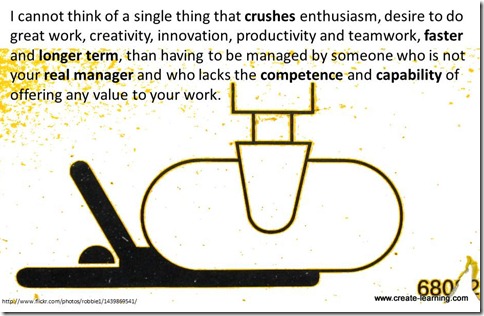Accountability: a situation where an individual can be called to account for their actions by another individual or body authorized both to do so and to give recognition to the individual for those actions (Jaques Requisite Organization 1998)

Organizations that lack an understanding and sense of accountability make employees feel like they are being asked to swim world record times in a pool of Jello. Everyone is trying hard … and the work system is forcing them to push harder and gain little progress.
This starts with confusion over what it means to be a Manager.
You are employed and paid for your efforts using your talents to complete certain work. You keep your job because you have proven effective in meeting expectations under your work conditions.
In management roles, people are employed and held accountable in two ways:
- Their effectiveness in completing work;
- The outputs of those they manage.
Manager: a person who is held accountable for the outputs of others, for sustaining a team capable of producing those outputs, and giving effective leadership to that team. (Jaques 1998)
Think about your organization…
- Who can be held accountable for whose outputs?
- How does this vagueness about “who is held accountable for your outputs” lead to confusion and frustration for everyone?
People have comfort stating who they report “to” and who they are accountable “to” – I report to my direct manager, and I’m accountable to her for completing these forms on time.”
The discomfort lies in management, whose outputs/work you may be held accountable “for” or who is accountable “for” their outputs – “As a manager, I am accountable for the team’s proper completion of the forms.”
Only one person can be held accountable for your output – your immediate manager – that is Accountability.
I cannot think of a single thing that crushes enthusiasm, desire to do great work, creativity, innovation, productivity, and teamwork faster and longer-term, than having to be managed by someone who is not your real manager and who lacks the competence and capability of offering any value to your work.
Think of a time and how you felt when you were subjected to a “boss” who was not your real manager and was unable to add any value to your work, solve any problems you presented, and didn’t have a clue to how your work gets done or set the proper context of your tasks to be completed.
How did you feel about having that manager assess your performance and personal effectiveness?
Accountability is held by the person responsible for your outputs; this generally is your direct manager. All you can be expected to do is your best work…You are accountable for doing your best work. Your manager is accountable for the work you produce.
A manager must be able to add value to the work of the team.
This concept will clear up accountability and authority issues within the organization. If you know and accept that, ultimately your manager is accountable for the output of the project and your work…then you can work cooperatively to accomplish the best work you can. Also, your manager will want to add value to your work and (if competent) will leave you alone to do your work.

